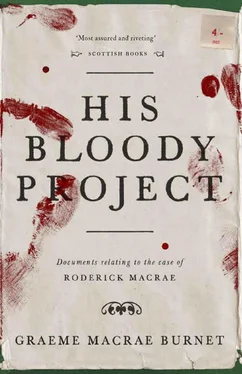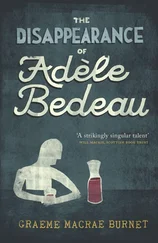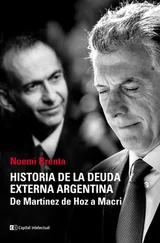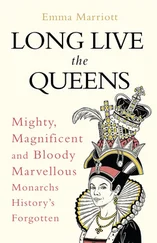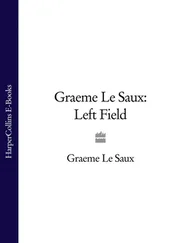This last remark lightened the atmosphere in the court for a moment and the Lord Justice-Clerk allowed the ripple of laughter to subside of its own accord.
‘This lack of remorse, then, is not, in your opinion as a medical man, a symptom of loss of reason?’
‘Not in the least, sir.’
‘You are aware that the prisoner has lodged a Special Defence of Insanity — that he was, at the time of committing these acts, alienated from his reason?’
‘I am.’
‘Did you find the prisoner to be labouring under a state of insanity?’
‘I did not.’
‘Is it possible that when he committed these acts, he was labouring under a state of insanity?’
‘Given the account of his crimes he provided to me and the rational manner in which he spoke, I do not believe that he was insane at the time of these acts.’
Mr Gifford then thanked the witness and concluded his questioning. Mr Sinclair rose for the defence.
‘How long,’ he asked, ‘have you been employed in the capacity of medical officer to Inverness gaol?’
‘Some eight years.’
‘You must have examined a great many prisoners in that time.’
‘Indeed I have.’
‘And what proportion of the prisoners you have examined would you consider to be insane?’
‘I am not sure I could say with any certainty.’
‘Half? More than half? Less than half?’
‘A great deal less than half.’
‘Could you be more specific?’
‘A very small proportion.’
‘Ten out of a hundred? Five out of hundred?’
‘Perhaps one out of a hundred.’
‘One out of a hundred! That is indeed a small proportion,’ Mr Sinclair exclaimed. ‘And the other ninety-nine men — what has brought them to your gaol?’
‘They have committed some crime or other, or have been accused of doing so.’
‘And why do these men — this ninety-nine per cent of men — commit their crimes?’
Dr Munro appeared somewhat bemused at this line of questioning. He looked towards the Lord Justice-Clerk, who merely indicated that he should answer the questions put to him.
‘If I was pressed to venture an opinion, I would say that they are there because they are unable to control their baser instincts.’
‘Their instincts to steal from or strike out at their fellows?’
‘For example, yes.’
‘But this inability to control their instincts is not, in your opinion, indicative of a loss of reason?’
‘No, sir.’
‘They are merely bad men.’
‘If you wish to express it thus.’
‘How would you express it?’
‘I would say that they are criminals, sir.’
Mr Sinclair paused rather theatrically and, while facing the gentlemen of the jury, asked, ‘So in ninety-nine per cent of the men you examine in your capacity as medical officer to the prison in this town, you find no signs of insanity.’
‘That is correct.’
‘Would it be correct to say, that in general, when you inspect the prisoners at the gaol, you are not looking for signs of insanity?’
‘My examinations are generally limited to a physical examination of the prisoners, yes.’
‘Do you consider yourself expert in the field of Criminal Anthropology?’
‘To the extent that I have been examining prisoners for eight years, I would consider myself to have some expertise.’
‘Would you consider yourself expert in the field of Criminal Psychology?’
‘I would.’
‘Could you explain to the court the meaning of the term “moral insanity”?’
‘I am not familiar with that term.’
‘Could you explain to the court the meaning of the term “mania without delirium”?’
Dr Munro shook his head.
‘You are not familiar with that term either. Are you familiar with the works of Monsieur Philippe Pinel?’†††
††† Philippe Pinel (1745–1826) was a pioneer of criminal psychology. He coined the term ‘mania sans délire’ in his Nosographie philosophique ou méthode de l’analyse appliquée à la médecine (1798–1818).
‘I am not.’
‘Are you familiar with the work of Dr James Cowles Prichard?’
‘I have heard of him.’
‘Then you will have read his volume, A Treatise on Insanity and Other Disorders Affecting the Mind ?’
‘I cannot recall.’
‘It is your testimony that you cannot recall whether you have read a work of the greatest significance in current thinking about the psychology of criminals; a field in which you profess expertise?’
‘My expertise is based on my experience examining members of the criminal population.’
‘A population which, by your own estimate, embraces only the minutest proportion of men labouring under mental disorders.’
‘Yes.’
‘Given that you have been called here today to provide testimony in the most solemn of proceedings, do you not think that as a professed expert it is your responsibility to acquaint yourself with the current thinking in that field?’
‘I do not believe that any medical man, if called upon to examine the prisoner, would reach a different conclusion to the one I reached.’
‘If you will forgive me, Dr Munro, that is not the question I put to you. The question I put to you is this: is it not your responsibility as a so-called professed expert in Criminal Psychology — the application of which is of crucial importance to this case — to fully apprise yourself of the thinking in this field?’
The good doctor was by this time, wrote Mr Philby, ‘becoming rather flustered and glanced about as if hoping to find a whisky bottle secreted in the witness box’.
Mr Sinclair did not press him for an answer, no doubt calculating that his silence was more damning than anything he might actually say. Instead he took a more conciliatory tone: ‘Perhaps I am being unreasonable,’ he began. ‘It might be more helpful if you could tell the jury what training or education you have received in the field of Criminal Psychology.’
Dr Munro looked beseechingly to the judge, who instructed him to answer with a gesture of his hand.
‘I have received no such training.’
Mr Sinclair, who was clearly relishing this revival in the fortunes of his case, directed an expression of great astonishment towards the jurymen.
‘Would it thus be more accurate to describe you as self-educated in this field?’
‘That would be more accurate, yes,’ replied the doctor.
‘In that case, perhaps, since you have read neither the works of Dr Prichard nor of Monsieur Pinel, you could tell the jury some of the volumes with which you have educated yourself.’
Dr Munro appeared to give this question some thought, before replying that he could not, at that moment, recall any specific titles.
‘You cannot recall a single volume which you have read on the subject in which, when asked earlier, you professed expertise?’
‘No.’
‘Are we then to understand, Dr Munro’ — he here made a sweeping gesture towards the jury — ‘that you are entirely unqualified to make any pronouncement on the state of mind of the prisoner?’
‘I believe I am qualified.’
‘But you have no qualifications!’
The witness did not appear to have the will to defend himself against the advocate’s onslaught, and with a meaningful shake of his head, Mr Sinclair concluded his examination.
Dr Munro, clearly relieved that his ordeal was over, made to exit the witness box, but was reprimanded by the Lord Justice-Clerk, as he had not yet been excused. Mr Gifford then rose to re-examine the witness. He apologised for detaining the doctor further, before asking him to remind the court how long he had been engaged in practice at Inverness gaol. He then asked the doctor how many prisoners he had examined in the course of his employment.
Читать дальше
